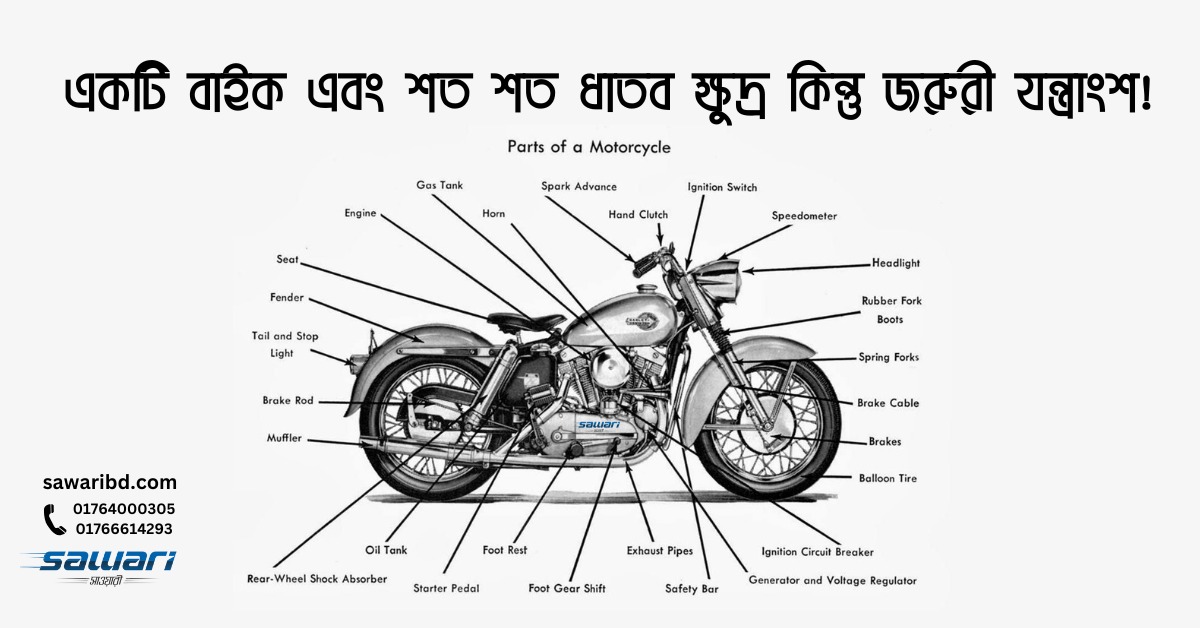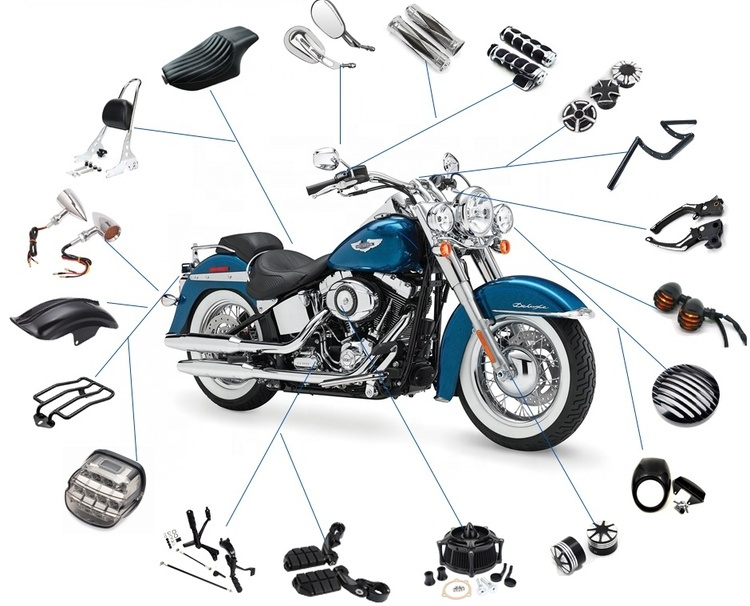Fix It Fast with Authentic OEM Parts New Zealand
Fix It Fast with Authentic OEM Parts New Zealand
Blog Article
Discover the Necessary Motorcycle Parts You Need for Optimal Efficiency
Recognizing the vital parts of a motorbike is essential for achieving peak efficiency. Each part, from the engine to the braking system, plays a vital duty in general performance and safety. Routine maintenance can protect against unforeseen failures and improve the riding experience. Nonetheless, several motorcyclists ignore the details of these systems. Discovering just how they function with each other can result in a more reliable trip. What crucial parts should every motorcyclist prioritize?
The Engine: The Heart of Your Motorbike
The engine acts as the core element of a motorcycle, driving its efficiency and specifying its abilities. It is in charge of converting gas into power, which powers the bike ahead. Numerous kinds of engines are used, consisting of single-cylinder, V-twin, and inline setups, each offering distinct characteristics fit for different riding designs and functions. The engine size, commonly determined in cubic centimeters (cc), significantly affects efficiency, with larger engines normally giving even more power and torque.Furthermore, the engine's design and innovation, such as gas injection systems or air-cooling versus liquid-cooling, influence efficiency and dependability. Maintenance is important for peak procedure; aspects like routine oil changes and checking ignition system guarantee longevity. Cyclists usually consider an engine's responsiveness and smoothness, as these features improve the overall riding experience. Eventually, the engine continues to be a critical component that defines not only the bike's efficiency yet also the biker's link to the maker.
The Transmission: Moving Gears Smoothly
The transmission plays an important function in a motorbike's performance, specifically in the mechanics of gear moving. Understanding just how to change equipments efficiently can boost the general riding experience, while normal maintenance warranties peak functionality. Appropriate focus to these aspects can considerably influence the longevity and efficiency of the motorbike.

Equipment Shifting Mechanics
Smooth equipment moving is crucial for ideal motorbike performance, substantially influencing both velocity and control. The mechanics of gear shifting involve the communication in between the clutch, equipment bar, and transmission system. When a motorcyclist involves the clutch, it disengages the engine from the transmission, enabling for a gear change without damaging the parts. A well-timed launch of the clutch, incorporated with specific movement of the gear bar, facilitates a seamless change between equipments. This procedure assures that the engine operates within its best power band, improving performance. Motorbike Components NZ. Additionally, recognizing the gear proportions and their result on rate and torque can aid cyclists make educated options throughout changes, inevitably adding to a more delightful and receptive riding experience
Upkeep Tips Value
Routine upkeep plays a crucial function in guaranteeing that the transmission system runs effectively, allowing for smooth equipment shifts. Consistently altering the transmission and examining fluid is vital, as old liquid can lead to increased friction and wear. In addition, checking the clutch for wear assurances peak engagement and disengagement, avoiding slippage throughout equipment changes. Lubrication of moving parts is just as essential to lower friction and boost performance. Motorbike proprietors ought to also check for leaks and uncommon noises, as these can show underlying issues. By sticking to these upkeep suggestions, motorcyclists can prolong the life-span of their transmission system, guaranteeing that equipment shifts continue to be smooth and adding to the general efficiency of their motorbike.
The Braking System: Ensuring Security on Every Ride
Braking systems are fundamental elements that straight affect a motorbike's security and efficiency. They contain various components, consisting of brake pads, blades, calipers, and hydraulic lines, all functioning together to guarantee effective deceleration. The kind of braking system-- typically either disc or drum-- affects responsiveness and stopping power.Regular maintenance is vital to copyright peak performance; worn brake pads can lead to decreased effectiveness and enhanced stopping distances. Additionally, the quality of brake fluid ought to be kept an eye on, as it can take in wetness gradually, jeopardizing stopping efficiency.Riders must likewise think about the value of anti-lock stopping systems (ABDOMINAL), which protect against wheel lockup throughout sudden quits, enhancing overall safety and security. Effectively functioning brakes are not almost quiting; they infuse self-confidence in the rider, enabling more secure navigating with various terrains. Inevitably, a dependable braking system is crucial for appreciating every ride with tranquility of mind.
The Suspension: Enhancing Convenience and Control
A well-functioning shock absorber substantially adds to a motorbike's general performance, enhancing the efficiency of the stopping system. The suspension plays a considerable duty in taking in shocks from irregular surfaces, guaranteeing a smoother adventure while preserving tire call with the road. This call is important for both security and control, allowing motorcyclists to navigate corners with self-confidence and precision.Different sorts of shock absorber, such as telescopic forks or mono-shocks, offer varying degrees of comfort and handling. Correctly tuned suspension boosts responsiveness, offering the motorcyclist with a more connected feeling to the motorcycle. Routine upkeep checks are essential to identify the suspension parts, consisting of springs and dampers, are functioning at their finest. A reliable suspension system not only boosts the riding experience but also contributes to the long life of various other motorbike components by reducing wear and tear. Because of this, investing in top quality suspension is crucial for any kind of significant motorcycle fanatic.
The Tires: Connecting You to the Road
Tires play a crucial role in a motorbike's performance, functioning as the key web link in between the rider and the road. Comprehending the various kinds of tires readily available can substantially impact dealing with and security. Additionally, regular maintenance is vital to guarantee peak tire performance and longevity.
Tire Keys In Explained
Just how do various tire types affect a motorcycle's efficiency? Tire types play an important function in identifying a motorcycle's stability, grip, and Motorcycle Spares Christchurch handling. Sport tires, created for high efficiency, offer improved traction and responsiveness on paved roadways, making them perfect for competing and hostile riding. On the other hand, touring tires focus on durability and comfort, giving a smoother experience for long-distance traveling. Off-road tires, characterized by their sturdy tread patterns, stand out in grip on unpaved surface areas, ideal for experience fanatics. In addition, dual-sport tires mix features from both on-road and off-road categories, catering to versatile riding needs. Eventually, picking the best tire type is important for optimizing efficiency, ensuring safety and security, and boosting the overall riding experience.
Maintenance Tips Offered
While riding on the roadway, preserving ideal tire condition is essential for security and efficiency. Regularly examining tire stress is necessary, as under-inflated tires can result in inadequate handling and raised wear. It is suggested to evaluate step depth frequently; worn tires compromise grasp and stability. Furthermore, riders ought to look for signs of damage, such as fractures or bulges, which can show the demand for replacement. Revolving tires regularly assures also wear, improving longevity. Maintaining tires clean from particles and preventing excessive visuals can extend their lifespan. Lastly, keeping proper positioning and equilibrium adds to come to a head efficiency, minimizing stress on various other bike parts. Abiding by these upkeep ideas will greatly improve the general riding experience.
The Fuel System: Fueling Efficiency and Effectiveness
The fuel system plays a vital function in optimizing a motorcycle's efficiency and performance, as it ensures the optimum delivery of fuel to the engine. It comprises several crucial parts, consisting of the gas container, fuel pump, gas filter, and fuel injectors or carburetor. Each part must operate effectively to guarantee a powerful and smooth ride.The fuel tank shops gasoline and supplies it to the engine by means of the fuel pump, which produces the needed pressure. A gas filter avoids impurities from entering the engine, while the injectors or carburetor mix fuel with air for combustion.Proper upkeep of the fuel system is important; a blocked filter or malfunctioning injector can cause decreased performance and boosted fuel usage. By verifying that the fuel system operates successfully, motorcyclists can delight in enhanced throttle feedback, far better gas economic situation, and on the whole boosted riding experience.
The Electric System: Powering Your Trip
An efficient electric system is vital for the general functionality and safety and security of a motorcycle, as it powers essential elements such as the ignition, illumination, and numerous digital systems. This system consists of the battery, which shops energy, and the alternator, in charge of generating power while the engine runs. The circuitry harness links these elements, making sure dependable power distribution.Additionally, fuses protect the system from overloads, while relays aid manage high-current devices with low-power signals. A well-kept electric system enhances efficiency by making sure smooth begins and regular procedure of lights and signals, important for rider presence and safety.Regular checks of the battery's charge and links are necessary for preventing electrical failures. Riders must likewise check electrical wiring for damage, ensuring all components work ideally. Inevitably, a durable electrical system contributes significantly to the total efficiency and reliability of the motorcycle.
Often Asked Concerns
Exactly how Often Should I Change My Motorbike's Battery?
The regularity of bike battery replacement relies on usage and maintenance (Motorbike Components NZ). Normally, batteries need to be replaced every three to 5 years. Regular checks can assist determine when a replacement is needed for peak efficiency
What Tools Do I Required for Basic Motorcycle Maintenance?
For fundamental motorbike maintenance, one calls for vital tools such as an outlet set, wrenches, screwdrivers, pliers, tire stress scale, and a torque wrench. These devices help with efficient maintenance and guarantee the bike runs successfully and safely.
How Can I Improve My Bike's Aerodynamics?
To improve bike aerodynamics, one need to think about readjusting fairings, making use of windscreen expansions, maximizing body placement, and lowering overall weight. These adjustments aid decrease drag, enhancing security and fuel effectiveness during rides.
What Are the Indicators of a Failing Electrical System?
Indications of a failing electrical system consist of dimming lights, trouble beginning, uneven instrument analyses, and blown merges. Motorbike Components NZ. Uncommon scents or corrosion around battery terminals might additionally indicate underlying issues requiring prompt focus for security and efficiency

Just how Do I Choose the Right Oil for My Motorcycle?
When selecting oil for a motorcycle, one need to take into consideration the manufacturer's requirements, viscosity scores, and the kind of riding. Additionally, standard versus artificial oil can influence performance and engine security, affecting the choice significantly. The engine size, commonly determined in cubic centimeters (cc), considerably influences performance, with larger engines usually providing more power and torque.Furthermore, the engine's style and innovation, such as fuel injection systems or air-cooling versus liquid-cooling, affect efficiency and integrity. A well-functioning suspension system substantially contributes to a motorcycle's overall efficiency, matching the performance of the stopping system. The gas system plays an essential role in making best use of a motorbike's efficiency and performance, as it guarantees the ideal distribution of gas to the engine. A gas filter protects against contaminants from entering the engine, while the injectors or carburetor mix fuel with air for combustion.Proper upkeep of the gas system is important; a stopped up filter or malfunctioning injector can lead to lowered performance and enhanced gas consumption. A well-maintained electrical system boosts efficiency by ensuring smooth beginnings and constant procedure of signals and lights, vital for rider presence and safety.Regular checks of the battery's cost and links are important for protecting against electric failures.
Report this page